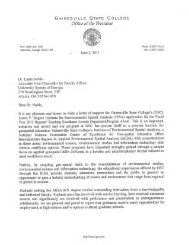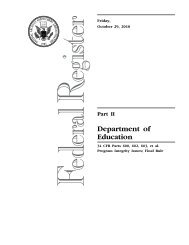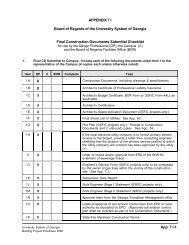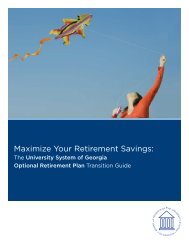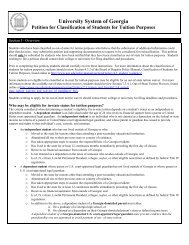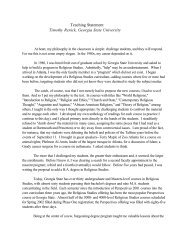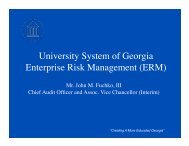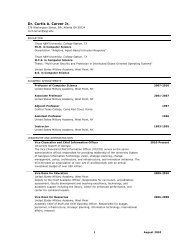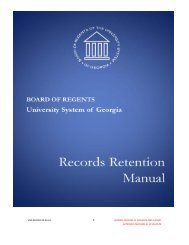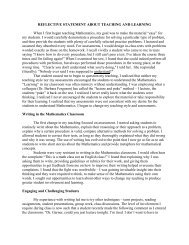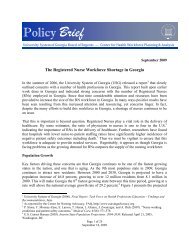75 years of transforming lives - University System of Georgia
75 years of transforming lives - University System of Georgia
75 years of transforming lives - University System of Georgia
Create successful ePaper yourself
Turn your PDF publications into a flip-book with our unique Google optimized e-Paper software.
<strong>75</strong> YEARS OF TRANSFORMING LIVES<br />
1990-2000<br />
Accessibility, Higher Standards and Technology<br />
Mark a Decade <strong>of</strong> Dramatic Change<br />
Accent on Access<br />
In the 90s, the Board <strong>of</strong> Regents adopted a sweeping new vision statement<br />
entitled “Access to Academic Excellence for the New Millennium.”<br />
Developed with input from institution presidents, it called for <strong>Georgia</strong>’s<br />
public colleges and universities to be recognized for first-rate undergraduate<br />
education, leading-edge research and committed public service. The<br />
Board <strong>of</strong> Regents also adopted a set <strong>of</strong> 34 Guiding Principles for Action as<br />
a foundation for future policy decisions.<br />
<strong>Georgia</strong>’s HOPE Scholarship Program<br />
Since Gov. Zell Miller established the HOPE (Helping Outstanding Pupils<br />
Educationally) Scholarship Program in 1993, over $3.2 billion in HOPE<br />
funds have been awarded to more than 950,000 students attending<br />
<strong>Georgia</strong>’s public and private colleges, universities, and technical colleges.<br />
HOPE, a merit-based student-aid program for students who graduate from<br />
<strong>Georgia</strong> high schools, provides financial assistance for students who have<br />
a “B” high school grade point average and enroll in degree, diploma, and<br />
certificate programs at eligible institutions. The program is funded entirely<br />
by The <strong>Georgia</strong> Lottery for Education. As <strong>of</strong> Fall 2004 (the most recent<br />
report available), more than 76 percent <strong>of</strong> the <strong>University</strong> <strong>System</strong>’s first-time<br />
freshmen entered the <strong>System</strong> with the help <strong>of</strong> a HOPE Scholarship.<br />
GALILEO Links Libraries<br />
During this decade, the <strong>System</strong> took advantage <strong>of</strong> growing Internet technology<br />
to link the libraries at all <strong>System</strong> institutions by creating GALILEO<br />
- <strong>Georgia</strong> Library Learning Online. The resource was developed in fewer<br />
than 150 days with a $10 million budget allocation from the general assembly.<br />
The advent <strong>of</strong> GALILEO literally opened the doors to libraries around<br />
the state to all students regardless <strong>of</strong> their home institution or location - and<br />
today it is available to all <strong>Georgia</strong>ns.<br />
<strong>System</strong> Uses Internet Technology to Expand Access<br />
The Board <strong>of</strong> Regents further paved the way to use the power and scope<br />
<strong>of</strong> the Internet to attract prospective students to <strong>Georgia</strong>’s institutions by<br />
recommending the creation <strong>of</strong> a “common admission application.” Two<br />
new online <strong>System</strong> programs set the stage for greater access to college<br />
courses, admissions information, and jobs. <strong>Georgia</strong>EASY, an online admissions<br />
site, <strong>of</strong>fered admissions, career and financial information and an<br />
“easy” online admissions form; and <strong>Georgia</strong>Hire linked businesses seeking<br />
qualified employees with students searching for jobs.<br />
Raising the Bar for Admissions<br />
In 1995, the Board <strong>of</strong> Regents sought to break the cycle <strong>of</strong> low admissions<br />
expectations and inadequate college preparation by adopting the Policy<br />
Direction on Admissions. It established higher admissions requirements,<br />
which led to record high average SAT scores for first-time freshmen and<br />
the highest retention rates ever recorded in <strong>Georgia</strong>. Five <strong>years</strong> later, at<br />
the beginning <strong>of</strong> the new millennium, average SAT scores <strong>of</strong> incoming<br />
freshmen in the <strong>University</strong> <strong>System</strong> <strong>of</strong> <strong>Georgia</strong> had increased by an impressive<br />
31 points. At the same time, the Board <strong>of</strong> Regents introduced a new<br />
P-16 Policy Direction that addressed the need for “co-reform” <strong>of</strong> public education<br />
in <strong>Georgia</strong> from pre-Kindergarten through high school and aimed at<br />
ensuring that all students who graduated from <strong>Georgia</strong> high schools were<br />
prepared for postsecondary education and ready to meet the heightened<br />
standards.<br />
Prioritizing Capital Expansion<br />
During this decade, the Board <strong>of</strong> Regents took action to organize and<br />
prioritize the process for requesting funds from the General Assembly for<br />
capital expansion at its various institutions. The adoption <strong>of</strong> Capital Priorities<br />
Principles became the core <strong>of</strong> a process by which the institutions,<br />
the <strong>System</strong> and the legislature worked systematically and equitably to set<br />
priorities and fund new buildings at campuses statewide.<br />
Semester Conversion Changes Calendar<br />
In a move designed to standardize the academic calendars <strong>of</strong> the 34<br />
institutions, the Board <strong>of</strong> Regents converted the <strong>University</strong> <strong>System</strong> calendar<br />
from quarters to semesters. Though the transition went well, it would<br />
be three <strong>years</strong> before enrollments returned to normal patterns.<br />
Guaranteed Quality in Teacher Preparation<br />
As part <strong>of</strong> a move to expand and enhance its teacher preparation programs<br />
and improve teacher quality in <strong>Georgia</strong>, the Board <strong>of</strong> Regents voted<br />
to guarantee the performance <strong>of</strong> teachers who graduated from its K-12<br />
programs. This was a promise to school systems that teacher preparation<br />
programs at <strong>University</strong> <strong>System</strong> institutions were <strong>of</strong> high quality and a<br />
guarantee that the system would retrain any new graduates whose performance<br />
was not satisfactory.<br />
Chancellor Stephen R. Portch (1994-2001)



